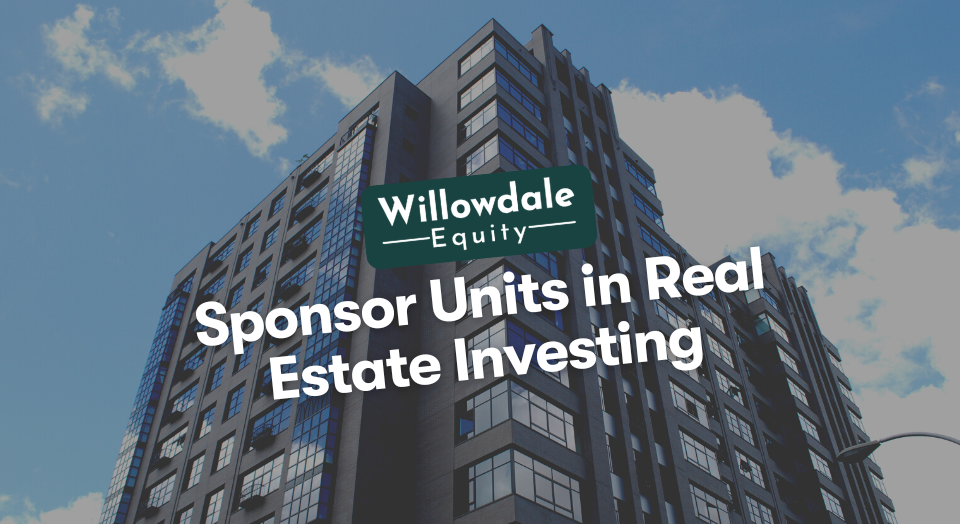
What is a Sponsor Unit in Real Estate Investing?
You might come across sponsor units while going through real estate listings, especially if you are looking at new construction. These rare finds have unique benefits, including cheaper rates and more straightforward application procedures.
Once you understand a sponsor unit, purchasing one is highly alluring. So, what is a sponsor unit in real estate investing? Here, you will learn all you need to know about a sponsor unit in real estate investing, including what it means, its advantages and disadvantages, how it affects a co-op, if it’s possible to rent out a sponsor unit, and more.
Key Takeaways
-
A condominium, co-op, or apartment that the builder or investor has kept after selling the other units is referred to as a sponsor unit.
-
Sponsor apartments typically cost less than other units in the rental building from a financial standpoint. The purchase price is solely at the discretion of the sponsor.
-
It is strongly encouraged for purchasers of sponsor units to look into the history of the tenancy.
What Is a Sponsor Unit? (Sponsor Unit Meaning)
A condominium, co-op, or apartment that the builder or investor has kept after selling the other units is referred to as a sponsor unit.
A sponsor unit differs from other units in that it has never been sold before. As a result, you are buying a sponsor unit from the building’s original developer or company rather than the previous owner.
Condo sponsor apartments and co-op sponsor units are the two categories of sponsor units you could come across when looking at real estate. Both unit categories come with their advantages and their disadvantages. The advantages of sponsor units are discussed next, followed by their disadvantages.
Advantages of Sponsor Units
- The primary benefit of purchasing a sponsored unit in a co-op building is avoiding the cumbersome board approval process. You can buy the condo as long as you have the necessary funds. Once the acquisition has been finalized, you will need to follow the building’s regulations, including any limitations on subletting.
- Sponsor apartments typically cost less than other units in the rental building from a financial standpoint. The purchase price is solely at the discretion of the sponsor.
- You could get away with a 10–25% down payment if they are okay with it and your financing is granted, which is a considerably better deal than the typical 25–30% down payment required for most co-ops. The purchasing procedure is quicker without a co-op interview or other financial criteria.
- By purchasing a co-op sponsor unit, you can avoid the anxiety and angst of going via co-op boards. This can reduce the overall stress of the home-buying process, allowing you to spend more time anticipating your new sponsor co-op apartment and less time worrying about it.
It’s now time to look at the disadvantages of sponsor units, such as a sponsor co-op unit.
Disadvantages of Sponsor Units
- Sponsor units have potential problems despite the flexible financing options and ability to skip the board interview or approval procedure.
- Unless the sponsor has previously renovated the unit before offering it, if you find a sponsor apartment in a coop, you’ll probably be looking at an apartment in “classic” or estate condition. While this may have a lot of character (such as original crown moldings and fittings), it could also indicate that the apartment hasn’t had many renovations in recent years. In this situation, the condo might need a total gut restoration before it is usable.
- It is strongly encouraged for purchasers of sponsor units to look into the history of the tenancy. It was probably a rent-controlled or rent-stabilized sponsor unit if it was only recently put on the market. Conducting due diligence on the property is crucial to guarantee that the tenants were not evicted from the apartment under dubious or unlawful circumstances.
- Cost is yet another drawback of buying a sponsor unit. Sponsor units are frequently in demand since they have a few standout benefits (such as less scrutiny of one’s finances and personal issues). It indicates that they often sell for a higher price than other apartments in the same coop.
- Co-op sponsor units almost always have extra closing costs, just like those in brand-new condos.
With the advantages and disadvantages of sponsor units, you may want to know how a sponsor unit affects a co-op unit. We look at that next.
How Does a Sponsor Unit Affect a Co-Op?
A unit sold by the co-op corporation that created the co-op or the owner of the building is known as a sponsor co-op. The most significant benefit of purchasing this kind of unit is that the board approval procedure is probably skipped.
In the 1970s and 1980s, most co-ops were transformed from rental buildings, and at that time, tenants had the option of purchasing or continuing to rent their apartments. If a renter didn’t buy the co-op unit, the sponsor would continue to own the flat and rent it to the renter. Today, you’ll notice the apartment advertised as a sponsor unit when the renter vacates and the owner of the condo building sells.
Despite the wear and tear they likely experienced as rentals, sponsor apartments can be slightly more costly than resale co-ops. Additionally, they frequently have higher closing costs than standard units. So, it’s now clear how a sponsor unit affects a co-op but is it possible to rent out a sponsor unit? Let’s find out.
Is It Possible to Rent Out a Sponsor Unit?

Some purchasers might be looking for a rental home to use as an investment. But that doesn’t imply you may rent the unit the building rents out to its sponsor.
In a co-op, you are expected to abide by the same regulations as everyone else after you purchase a sponsor unit. It covers the “sublet policy” of the building, which is co-op lingo for renting out a co-op sponsor unit.
This distinction is crucial. While you can enter the co-op without following the regulations, sponsor rights are lost when the ownership changes. After purchasing the unit, you will be an ordinary partner bound by the same subletting rules as everyone else.
Which Is Costlier—Sponsor Units or Resale Co-Ops?
Because there is a bigger pool of potential buyers, sponsor apartments in a co-op will cost slightly more than a typical resale. If the building, for instance, prohibits pieds-a-terre, a sponsored unit will have access to both familiar purchasers and pied-a-terre buyers in addition to regular buyers.
Additionally, buyers pay more for the speedy and guaranteed closing. Naturally, more significant closing charges will also increase the cost.
We have covered all bases regarding what is a sponsor unit. However, a few frequently asked questions (FAQs) regarding sponsor units need to be answered. That is what we will be doing next.
Frequently Asked Questions About What is a Sponsor Unit
New York City has a distinct class of apartments known as sponsor units. In a condo building, a sponsor co-op is a unit the developer owns and is offered for sale for the first time. In a co-op, a sponsor unit is either owned by the original owner or one that the co-op corporation transformed from a rental.
The sponsor is the individual or organization that purchased the building as a rental property and converted it into a cooperative.
Sponsor Units — Conclusion
A sponsor unit resembles a cross between a condo and a cooperative. When you purchase it without the board’s approval, it is a condo, but after you do, it becomes a regular co-op.
A sponsor unit can be the ideal solution for your apartment purchasing requirements.
Sources:
- MoneyInc., “The Benefits of Purchasing a “Sponsor” Apartment in Manhattan”
- PropertyNest, “What is a Sponsor in New York Real Estate?”
Interested In Learning More About PASSIVE Real Estate Investing In Multifamily Properties?
Get Access to the FREE 5 Day PASSIVE Real Estate Investing Crash Course.
In this video crash course, you’ll learn everything you need to know from A to Z
about passive investing in multifamily real estate.
We’ll cover topics like earned income vs passive income, the tax advantages, why multifamily, inflation, how syndications work, and much much more!




